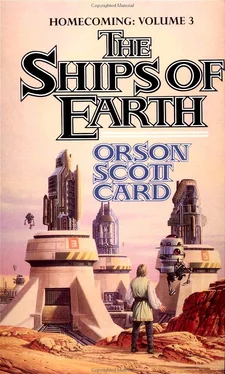Orson Card - THE SHIPS OF EARTH
Здесь есть возможность читать онлайн «Orson Card - THE SHIPS OF EARTH» весь текст электронной книги совершенно бесплатно (целиком полную версию без сокращений). В некоторых случаях можно слушать аудио, скачать через торрент в формате fb2 и присутствует краткое содержание. Жанр: Фантастика и фэнтези, на английском языке. Описание произведения, (предисловие) а так же отзывы посетителей доступны на портале библиотеки ЛибКат.
- Название:THE SHIPS OF EARTH
- Автор:
- Жанр:
- Год:неизвестен
- ISBN:нет данных
- Рейтинг книги:4 / 5. Голосов: 1
-
Избранное:Добавить в избранное
- Отзывы:
-
Ваша оценка:
- 80
- 1
- 2
- 3
- 4
- 5
THE SHIPS OF EARTH: краткое содержание, описание и аннотация
Предлагаем к чтению аннотацию, описание, краткое содержание или предисловие (зависит от того, что написал сам автор книги «THE SHIPS OF EARTH»). Если вы не нашли необходимую информацию о книге — напишите в комментариях, мы постараемся отыскать её.
THE SHIPS OF EARTH — читать онлайн бесплатно полную книгу (весь текст) целиком
Ниже представлен текст книги, разбитый по страницам. Система сохранения места последней прочитанной страницы, позволяет с удобством читать онлайн бесплатно книгу «THE SHIPS OF EARTH», без необходимости каждый раз заново искать на чём Вы остановились. Поставьте закладку, и сможете в любой момент перейти на страницу, на которой закончили чтение.
Интервал:
Закладка:
But he needn't have worried. Meb arose almost at once and, with Dol and their children in tow, followed him away from the meeting; Vas and Obring and their wives also got up, and then Zdorab and Shedemei. The meeting was over—and it was over because Elemak had said it was over.
Round one for me, thought Elemak, and I'll be surprised if that isn't the whole match. Poor Nafai. Whatever you're doing out in the woods, you're going to come home and find all your plots and plans in disarray. Did you think you could really face me down from a distance and win?
There was no writing anywhere, no signs, no instructions.
(No one needs instructions here. I am with you always in this place, showing you what you need to know.)
"And they were content with this?" asked Nafai. "All of them?" His voice was so loud in the silence of this place, as he scuffed along the dustless catwalks and corridors, making his way downward, downward into the earth.
(They knew me. They had made me, had programmed me. They knew what I could do. They thought of me as their library, their all-purpose instruction manual, their second memory. In those days I knew only what they had taught me. Now I have forty million years of experience with human beings, and have reached my own conclusions. In those days I was much more dependent on them —I reflected back to them their own picture of the world.)
"And their picture—was it wrong?"
(They did not understand how much of their behavior was animal, not intellectual. They thought that they had overcome the beast in them, and that with my help all their descendants would drive out the beast in a few generations—or a few hundred, anyway. Their vision was long, but no human being can have that long a vision. Eventually the numbers, the dimensions of time, become meaningless.)
"But they built well," said Nafai.
(Well but not perfectly. I have suffered forty million years of cosmic and nuclear radiation that has torn apart much of my memory. I have vast redundancy, and so in my data storage there has been no meaningful loss. Even in my programming, I have monitored all changes and corrected them. What I could not monitor was the area hidden from myself. So when the programs there decayed, I could not know it and could not compensate for it. I couldn't copy those areas and restore them when any one copy decayed.)
"So they didn't plan well at all," said Nafai, "since those programs were at your very core."
(You mustn't judge them harshly. It never occurred to them that it would take even a million years for their children's children to learn peace and be worthy to enter this place and learn all about advanced technologies. How could they guess that century after century, millennium after millennium, the humans of Harmony would never learn peace, would never cease trying to rule over one another by force or deception? I was never meant to keep this place closed off for even a million years, let alone forty million. So they built well indeed—the flaws and failures in my secret core were not fatal, were they? After all, you're here, aren't you?)
Nafai remembered his terror when he had had no air to breathe, and wasn't sure that they hadn't cut it all a little fine.
"Where are you?" asked Nafai.
(All around you.)
Nafai looked, and saw nothing in particular.
(The sensors there, in the ceiling—those are how I see you right now, and hear you, besides my ways of seeing through your eyes, and hearing your words before you say them. Behind all these walls are bank after bank of static memory—all of that is my self. The machinery pumping air through these underground passages—they are also me.)
"Then why did you need me at all?" asked Nafai.
(You are the one who broke me out of my loop and opened up my vision to include my own heart, and you ask me that?)
"Why do you need me now?"
(I also need you—all of you—because the Keeper has sent you dreams. The Keeper wants you, and so I will bring you.)
"Why do you need me?" he asked, clarifying the question even further.
(Because my robots were all controlled by a place in my memory that has become completely untrustworthy. I have shut them down because they were reporting falsely to me. No one ship of these six has a fully uncorrupted memory. I need you to collect and test the memory in every part of the ships and bring good memory together until we have one perfect ship. I can't do this myself—I have no hands.)
"So I'm here to replace broken machines."
(And I need you to pilot the starship.)
"Don't tell me you can't do that yourself."
(Your ancestors did not let their starships pass completely under the control of computers like me, Nafai. There must be a starmaster on every ship, to give command. I will carry out those commands, but the ship will be yours. I will be yours.)
"Not me," said Nafai. "Father should do this."
(Volemak didn't come here. Volemak didn't open this place.)
"He would have, if he'd known."
(He knew what you knew. But you acted. These things are not accidental, Nafai. It isn't coincidence that you are here and no one else is. If Volemak had found this place and forced his way in, risking his own life for the sake of coming here, then he would wear the cloak. Or Elemak, or Zdorab—whoever came would have that responsibility. It was you. It is yours.)
Almost Nafai said, I don't want it. But that would be a lie. He wanted it with his whole heart. To be the one chosen by the Oversoul to pilot the starship, even though he knew nothing about piloting anything—that would be wonderful. More glory and accomplishment than he ever dreamed of in his childhood. "I'll do it then," said Nafai, "as long as you show me how it's done."
(You can't do it without tools. I can give you some of them, and teach you how to make the rest. And you can't do it without help.)
"Help?"
(There will be thousands of memory plates to move from one ship to another. You will grow old and die if you try to do it all yourself. Your whole village will need to work together, if we are to have a reliable starship that contains all of the memory that I will need to bring to the Keeper of Earth.)
At once Nafai tried to imagine Elemak doing any job under his direction, and he laughed aloud. "If that's so, then you'd better put someone else in charge. They won't follow me."
(They will.)
"Then you don't understand human nature very well after all," said Nafai. "The only reason we've had peace among us these past few years is that I've stayed pretty much in my place, as far as Elya is concerned. If I suddenly come back and tell them that I'm the starmaster and they have to help me put together a starship…"
(Trust me.)
"Yeah, right. I always have, haven't I?"
(Open the door.)
Nafai opened the door and stepped into a dimly lighted room. The door closed behind him, shutting off much of what light there had been. Blinking, Nafai soon grew accustomed to the dimmer light and saw that in the middle of the room, hanging in the air with no obvious means of support, was a block of—what, ice?
(Much of it is water.)
Nafai approached it, reached out, touched it. His finger went in easily.
(As I said. Water.)
"How does it hold this shape, then?" asked Nafai. "How does it float in the air?"
(Why should I explain, when in a few moments the memory will be yours just for the thinking of it?)
"What do you mean?"
(Pass through the water and you will emerge wearing the cloak of the starmaster. When that is in place, linked to you, then all my memories will be yours, as if they had been yours all along.)
"A human mind could never hold such information," said Nafai. "Your memory includes forty million years of history."
Читать дальшеИнтервал:
Закладка:
Похожие книги на «THE SHIPS OF EARTH»
Представляем Вашему вниманию похожие книги на «THE SHIPS OF EARTH» списком для выбора. Мы отобрали схожую по названию и смыслу литературу в надежде предоставить читателям больше вариантов отыскать новые, интересные, ещё непрочитанные произведения.
Обсуждение, отзывы о книге «THE SHIPS OF EARTH» и просто собственные мнения читателей. Оставьте ваши комментарии, напишите, что Вы думаете о произведении, его смысле или главных героях. Укажите что конкретно понравилось, а что нет, и почему Вы так считаете.









